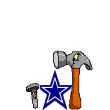Read my original post. As I explained, on the whole, teams are better off trading down, out of the first round, since the difference in the cost of first-round picks and second-round picks exceeds the difference in their performance, on average. Even when you think you're better off staying in the first round because the guy you want is a "sure thing," you're still probably better off trading down. If that "sure thing" has injury problems, you're in big trouble. The fact that "sure things" such as Courtney Brown, Ki-Jana Carter and Steve Emtman busted BECAUSE of injuries is irrelevant, because it's an assumed risk in the equation, no matter where the player is drafted. Since nobody has a crystal ball that tells them which "sure things" are going to bust because of injuries, they'd be better off -- on average -- trading out of the first round


